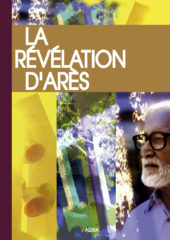It was part of the witness Michel Potay’s duties to explain the Word in a practical language. Under the collection: And what you shall have written, the witness’s teaching nourishes believer’s and non-believer’s soul as the Maker’s Word.
It is to inspire the Arès Pilgrims with some right ways of fulfilling the expectations they would get from The Revelation of Arès that the Maker asked his witness to write. Hence the title common to every one of his books: And what you shall have written (The Revelation of Arès, 33/10).
Through his books the witness goes about various subjects and problems, usually spiritual, often practical and anecdotal. Trough they all have been written with the more intention of guiding the author’s brothers and sisters in faith, these books have become highly valued by other kinds of readers. He has pondered on all that those who have made The Revelation of Arès their ideal in life may be interested in. By doing so his thought has widely gone beyond the bounds of faith. It has encompassed man and the world as a whole, whether believing or unbelieving. Among other subjects he has treated the following.
Ever since 1974 the free movement, which people called the Arès Pilgrims movement as early as 1975 or 1976, has been developing in France and in other French-speaking countries and has started spreading spontaneously through the world. That movement is not a religion. It is a movement of spiritual liberation through individual self freeing from evil. The Arès Pilgrims have no ruler, no dogma, no law. Each of them follows his or her own conscience; therefore, the cohesion between the Arès Pilgrims is a cohesion between consciences.
From that natural movement, which The Revelation of Arès names the small remnant, some natural missions have come into existence, which The Revelation of Arès names harvests. The missions call on man to become a penitent and in his or her turn to call on other men to become penitents and so on to change the wolrd little by little and from generation to generation.
Penitence in The Revelation of Arès has a joyful, enthusiastic meaning. The word is never reminiscent of the religious ideas of remorse or atonement. A penitent is simply the one that re-creates himself or herself through love, peace, spiritual freedom, forgiveness, spiritual intelligence, the heart’s intelligence, which is necessary to offset intellectual intelligence, a tool excellent and legitimate but now on the way to turn invasive and calamitous.
The Ares Pilgrim is the one who seeks after –or better finds back– spiritual happiness, premises of the final general happiness.
-
CHF34.00

Edition 1997, bilingue, français-anglais – Bilingual French-English
Parallèlement à La Révélation d’Arès, sans cesse rééditée depuis 1974, Michel Potay a publié depuis 1989 Le Pèlerin d’Arès sous forme d’une série de livres qui traitent de sujets de fond essentiels pour la vie spirituelle. Ce volume est le dernier de la série.
In Parallel to The Revelation of Arès, continually reprinted since 1974, Michel Potay has published Le Pèlerin d’Arès (wihch means The Arès Pilgrim or The Pilgrim to Arès) as a series of books who contains features, all of them essential to spiritual life. This volume is the last of the serie.
Order -
CHF29.00

Edition 1993, bilingue, français-anglais – Bilingual French-English
Parallèlement à La Révélation d’Arès, sans cesse rééditée depuis 1974, Michel Potay a publié depuis 1989 Le Pèlerin d’Arès sous forme d’une série de livres qui traitent de sujets de fond essentiels pour la vie spirituelle. Ce volume est le troisième de la série.
In Parallel to The Revelation of Arès, continually reprinted since 1974, Michel Potay has published Le Pèlerin d’Arès (wihch means The Arès Pilgrim or The Pilgrim to Arès) as a series of books who contains features, all of them essential to spiritual life. This volume is the third of the serie.
Order -
CHF29.00

Edition 1991, bilingue, français-anglais – Bilingual French-English
Parallèlement à La Révélation d’Arès, sans cesse rééditée depuis 1974, Michel Potay a publié depuis 1989 Le Pèlerin d’Arès sous forme d’une série de livres qui traitent de sujets de fond essentiels pour la vie spirituelle. Ce volume est le deuxième de la série.
In Parallel to The Revelation of Arès, continually reprinted since 1974, Michel Potay has published Le Pèlerin d’Arès (wihch means The Arès Pilgrim or The Pilgrim to Arès) as a series of books who contains features, all of them essential to spiritual life. This volume is the second of the serie.
Order -
CHF29.00

Edition 1990, bilingue, français-anglais – Bilingual French-English
Parallèlement à La Révélation d’Arès, sans cesse rééditée depuis 1974, Michel Potay a publié depuis 1989 Le Pèlerin d’Arès sous forme d’une série de livres qui traitent de sujets de fond essentiels pour la vie spirituelle. Ce volume est le premier de la série.
In Parallel to The Revelation of Arès, continually reprinted since 1974, Michel Potay has published Le Pèlerin d’Arès (wihch means The Arès Pilgrim or The Pilgrim to Arès) as a series of books who contains features, all of them essential to spiritual life. This volume is the first of the serie.
Order





